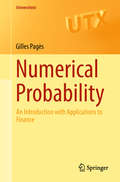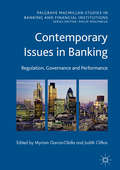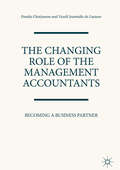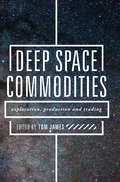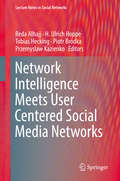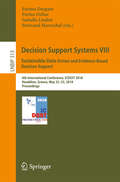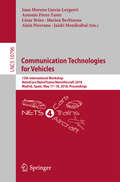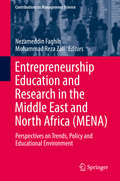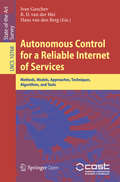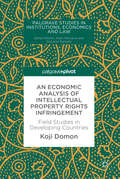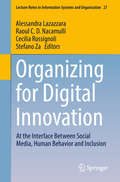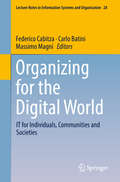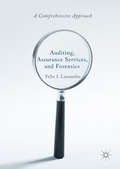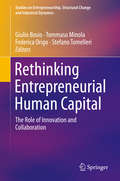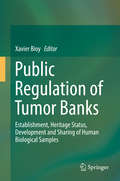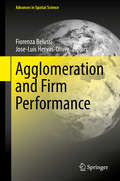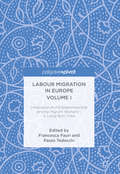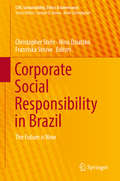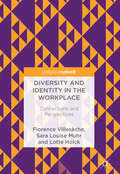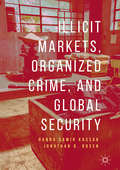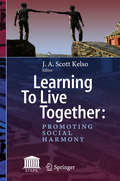- Table View
- List View
Numerical Probability: An Introduction with Applications to Finance (Universitext)
by Gilles PagèsThis textbook provides a self-contained introduction to numerical methods in probability with a focus on applications to finance. Topics covered include the Monte Carlo simulation (including simulation of random variables, variance reduction, quasi-Monte Carlo simulation, and more recent developments such as the multilevel paradigm), stochastic optimization and approximation, discretization schemes of stochastic differential equations, as well as optimal quantization methods. The author further presents detailed applications to numerical aspects of pricing and hedging of financial derivatives, risk measures (such as value-at-risk and conditional value-at-risk), implicitation of parameters, and calibration. Aimed at graduate students and advanced undergraduate students, this book contains useful examples and over 150 exercises, making it suitable for self-study.
Contemporary Issues in Banking: Regulation, Governance and Performance (Palgrave Macmillan Studies in Banking and Financial Institutions)
by Myriam García-Olalla Judith CliftonThis book offers insights into the contemporary issues in banking with a special focus on the recent European regulatory reforms, governance and the performance of firms. Written by prestigious professors and expert academics in the field, the book also covers a diverse set of topics that have gained great importance in this sector such as firm financing, culture, risk and other challenges faced by banks. The book is of interest to scholars, students and professionals in banking.
Regulating Investor Protection under EU Law: The Unbridgeable Gaps with the U.S. and the Way Forward
by Antonio MarcacciThis book analyzes the legal system for the protection of retail investors under the European Union law of investment services. It identifies the regulatory leitmotiv driving the EU lawmaker and ascertains whether and to what extent such a system is self-sufficient, using a set of EU-made and EU-enforced rules that is essentially different and autonomous from the domestic legal orders. In this regard, the book takes a double perspective: comparative and intra-firm. Given the federal dimension of the US legal system and, thus, the “role-model” it plays vis-à-vis the EU, the book compares the two systems. To fully highlight the existing gaps and measure how self-sufficient the EU system is against its American counterpart, the Union/Federal level as such is analyzed – i.e., detached from the national (in EU terms) and State (in US terms) level. Regulating Investor Protection under EU Law also showcases the unique intra-firm perspective from a European investment firm and analyzes how EU-produced public-law rules become a set of compliance requirements for investment services providers. This “within-the-firm” angle gauges the self-sufficiency of the EU system of retail investor protection from the standpoint of an EU-regulated entity. The book is intended for both compliance professionals and academic scholars interested in this topic while also including illustrative sections intended to provide a broader regulatory view for less-experienced readers.
The Changing Role of the Management Accountants: Becoming A Business Partner
by Panida Chotiyanon Vassili Joannidès de LautourThis book presents a comprehensive and holistic study on being a financial practitioner today. Using a practice theory approach, the book analyzes the work life stories of four financial practitioners who have been working between 13 and 25 years during the period of 1973 to 2015 and explains how their work identities are constituted in the practices throughout the years. It clarifies the public image of the management accountants and provides a better understanding of today’s management accountants—who they are and how they are formed—while theorizing on how to develop the next generation.
Deep Space Commodities: Exploration, Production and Trading
by Tom JamesWelcome to the new space economy... Space is open for business! The dawn of a new space race led by private sector entrepreneurs is upon us thanks to the USA Space Act 2015 and technology advances like SpaceX rockets, which have greatly reduced the cost of space flight. For the first time in history, the advances in both technical and legal infrastructure have opened up exciting opportunities that are already driving the commercial exploration of deep space commodities, Space tourism with Virgin Galactic, and the serious planning for the colonisation of our Moon and Mars. Tom James, a leading commodity and energy market practitioner and author, has brought together top professionals in academia, astropolitics, space engineering, and space law to explore the exciting opportunities and challenges businesses face in the new off-planet economy. With quadrillions of dollars of mineral wealth and frozen water within our reach, the stakes may be high, but so are the rewards.So pack your bags, fasten your oxygen mask and let’s get ready to boldly take business where business has not gone before...
Network Intelligence Meets User Centered Social Media Networks (Lecture Notes in Social Networks)
by Reda Alhajj H. Ulrich Hoppe Tobias Hecking Piotr Bródka Przemyslaw KazienkoThis edited volume presents advances in modeling and computational analysis techniques related to networks and online communities. It contains the best papers of notable scientists from the 4th European Network Intelligence Conference (ENIC 2017) that have been peer reviewed and expanded into the present format. The aim of this text is to share knowledge and experience as well as to present recent advances in the field. The book is a nice mix of basic research topics such as data-based centrality measures along with intriguing applied topics, for example, interaction decay patterns in online social communities. This book will appeal to students, professors, and researchers working in the fields of data science, computational social science, and social network analysis.
Decision Support Systems VIII: 4th International Conference, ICDSST 2018, Heraklion, Greece, May 22–25, 2018, Proceedings (Lecture Notes in Business Information Processing #313)
by Fatima Dargam Pavlos Delias Isabelle Linden Bertrand MareschalThis book constitutes the proceedings of the 4th International Conference on Decision Support Systems, ICDSST 2018, held in Heraklion, Greece, in May 2018. The main topic of this year’s conference was “Sustainable Data-Driven and Evidence Based Decision Support”. The 15 papers presented in this volume were carefully reviewed and selected from 71 submissions. They were organized in topical sections named: decision support systems for a sustainable society; decision support systems serving the public; decision support systems in management and organization; and advances in decision support systems’ technologies and methods. The EWG-DSS series of International Conference on Decision Support System Technology (ICDSST), starting with ICDSST 2015 in Belgrade, were planned to consolidate the tradition of annual events organized by the EWG-DSS in offering a platform for European and international DSS communities, comprising the academic and industrial sectors, to present state-of-the-art DSS research and developments, to discuss current challenges that surround decision-making processes, to exchange ideas about realistic and innovative solutions, and to co-develop potential business opportunities.
Communication Technologies for Vehicles: 13th International Workshop, Nets4Cars/Nets4Trains/Nets4Aircraft 2018, Madrid, Spain, May 17-18, 2018, Proceedings (Lecture Notes in Computer Science #10796)
by Juan Moreno García-Loygorri Antonio Pérez-Yuste César Briso Marion Berbineau Alain Pirovano Jaizki MendizábalThis book constitutes the proceedings of the 13th International Workshop on Communication Technologies for Vehicles, Nets4Cars/Nets4Trains/Nets4Aircraft 2018, held in Madrid, Spain, in May 2018.The 17 full papers presented together with 2 demo papers in this volume were carefully reviewed and selected from numerous submissions.The volume features contributions in the theory or practice of intelligent transportation systems (ITS) and communication technologies for:- Vehicles on road: e.g. cars, tracks and buses;- Air: e.g. aircraft and unmanned aerial vehicles; and - Rail: e.g. trains, metros and trams.
Entrepreneurship Education and Research in the Middle East and North Africa: Perspectives on Trends, Policy and Educational Environment (Contributions to Management Science)
by Nezameddin Faghih Mohammad Reza ZaliThis contributed volume explores and reveals the new developments, dynamics and recommendations for entrepreneurship education in the Middle East and North Africa (MENA) region. Presenting papers by respected experts in the field, it shares essential insights on the status quo of entrepreneurial education and training programs, the characteristics and motivations of early stage entrepreneurs, and the regional framework conditions in MENA. The book closes with a bibliometric perspective on the trends in the entrepreneurship research and education being developed in MENA.
Alternative Food Networks: An Interdisciplinary Assessment
by Alessandro Corsi Filippo Barbera Egidio Dansero Cristiana PeanoIn recent years, Alternative Food Networks (AFNs) have been a key issue both in the scientific community and in public debates. This is due to their profound implications for rural development, local sustainability, and bio-economics. This edited collection discusses what the main determinants of the participation of operators – both consumers and producers – in AFNs are, what the conditions for their sustainability are, what their social and environmental effects are, and how they are distributed geographically. Further discussions include the effect of AFNs in structuring the food chain and how AFNs can be successfully scaled up.The authors explicitly take an interdisciplinary approach to analyse AFNs from different perspectives, using as an example the Italian region of Piedmont, a particularly interesting case study due to the diffusion of AFNs in the area, as well as due to the fact that it was in this region that the ‘Slow Food’ movement originated.
Autonomous Control for a Reliable Internet of Services: Methods, Models, Approaches, Techniques, Algorithms, and Tools (Lecture Notes in Computer Science #10768)
by Ivan Ganchev R. D. van der Mei Hans van den BergThis open access book was prepared as a Final Publication of the COST Action IC1304 “Autonomous Control for a Reliable Internet of Services (ACROSS)”. The book contains 14 chapters and constitutes a show-case of the main outcome of the Action in line with its scientific goals. It will serve as a valuable reference for undergraduate and post-graduate students, educators, faculty members, researchers, engineers, and research strategists working in this field. The explosive growth of the Internet has fundamentally changed the global society. The emergence of concepts like SOA, SaaS, PaaS, IaaS, NaaS, and Cloud Computing in general has catalyzed the migration from the information-oriented Internet into an Internet of Services (IoS). This has opened up virtually unbounded possibilities for the creation of new and innovative services that facilitate business processes and improve the quality of life. However, this also calls for new approaches to ensuring the quality and reliability of these services. The objective of this book is, by applying a systematic approach, to assess the state-of-the-art and consolidate the main research results achieved in this area.
An Economic Analysis of Intellectual Property Rights Infringement: Field Studies in Developing Countries (Palgrave Studies in Institutions, Economics and Law)
by Koji DomonUsing unique field research from across Asia, this book examines the real markets of illicit products that breach intellectual property rights (IPR). The text presents three case studies regarding IPR infringements: unauthorised music content; fake spare parts of motorcycles; and fake Japanese food. Each study has unique characteristics, though their general concepts and problems have similar roots. The book shows what is happening in the black market and systems of illicit trade, providing information for stakeholders in Intellectual Property Rights to consider in devising effective methods for minimizing profits lost to copied and fake products.
Organizing for Digital Innovation: At the Interface Between Social Media, Human Behavior and Inclusion (Lecture Notes in Information Systems and Organisation #27)
by Alessandra Lazazzara Raoul C.D. Nacamulli Cecilia Rossignoli Stefano ZaThis book presents a collection of research papers exploring the human side of digital innovation management, with a specific focus on what people say and share on social media, how they respond to the introduction of specific IT tools, and how digital innovations are impacting sustainability and inclusion. Given the plurality of views that it offers, the book is particularly relevant for digital technology users, companies, scientists and governments. The overall spread of digital and technological advances is enhanced or hampered by people’s skills, behaviors and attitudes. The challenge of balancing the digital dimension with humans situated in specific contexts, relations and networks has sparked a growing interest in how people use and respond to digital innovations. The content of the book is based on a selection of the best papers – original double-blind peer-reviewed contributions – presented at the annual conference of the Italian chapter of the AIS, which was held in Milan, Italy, in October 2017.
Organizing for the Digital World: It For Individuals, Communities And Societies (Lecture Notes in Information Systems and Organisation #28)
by Federico Cabitza Carlo Batini Massimo MagniThis book argues that “organizing” is a broader term than managing, as it entails understanding how people and machines interact with each other; how resources, data, goods are exchanged in complex and intertwined value chains; and how lines of action and activities can be articulated using flexible protocols and often ad-hoc processes in situated practices of use and production. The book presents a collection of research papers shedding new light on these phenomena and related practices from both academic and professional perspectives. Given the plurality of views that it offers, the book makes a relevant contribution to the understanding and appreciation of the complexity of the digital world at various levels of granularity. It focuses on how individuals, communities and the coopetitive societies of our new, global and hyperconnected world produce value and pursue their objectives and ideals in mutually dependent ways. The content of the book is based on a selection of the best papers - original double-blind peer-reviewed contributions - presented at the annual conference of the Italian chapter of the AIS, which was held in Milan, Italy in October 2017.
Auditing, Assurance Services, and Forensics: A Comprehensive Approach
by Felix I. LessamboThis book provides a comprehensive presentation of auditing theory and practice. It simplifies audit concepts often considered abstract or vague to many. Written in a clear, concise, and understandable manner, the book covers the often uncovered and daring area of forensic auditing and analyses the approach thereof. Additionally, it covers the use of blockchain in audit through several illustrations and examples, and would be of interest to students, academics, and even junior auditors.
Rethinking Entrepreneurial Human Capital: The Role of Innovation and Collaboration (Studies on Entrepreneurship, Structural Change and Industrial Dynamics)
by Giulio Bosio Tommaso Minola Federica Origo Stefano TomelleriThis book focuses on the specific traits and nature of entrepreneurial human capital and the extent to which it can be stimulated by entrepreneurship education – especially when these activities combine collaborative practices and innovation. It includes a comprehensive collection of articles on how entrepreneurship education can be structured, providing theoretical reflections as well as empirical evidence. As such it contributes to the ongoing debate on the teachability of entrepreneurial skills and the role of innovation and collaboration in the design of educational programs that aim to spread entrepreneurial human capital.
Public Regulation of Tumor Banks: Establishment, Heritage Status, Development and Sharing of Human Biological Samples
by Xavier BioyThe multidisciplinary book assesses the legal and economic uncertainties surrounding the collection, storage, provision and economic development of biological samples (tumors, tissues, cells) and associated personal data related to oncology. Public, partly public and private sector actors in the field of cancer care and research hold collections supported by significant public and social funding. Under certain conditions, particularly in the context of networking (sometimes promoted by public authorities), these collections can also represent major economic assets and scientific resources. However, this involves a number of issues and institutional constraints: legal: the will of the source person; non-pecuniary damage; freedom to establish collections; competence in deciding on their use; legal frameworks for their distribution; desire for return on investment for public institutions, notably in terms of industrial and intellectual property.economic: cost of establishing and running biological resource centres; destroying resources; emerging markets; profit sharing.public health policy choices: prioritisation of therapeutic measures over research (fundamental or clinical trials); conservation of resources; promotion of scientific (and not commercial) value of collections. The establishment, heritage recognition (“patrimonialisation”), development and sharing of these resources thus merit our calling into question present practices and their evolution, as well as the leverage available to public authorities (incentives, legislation, regulation) in a context where norms emerge from professional practice to become widely used in collaborative networks. Filling a gap in the current literature on law and economics, which pays little heed to these specific considerations, this book explores these considerations to bring to light the economic implications of ethical choices and governance issues in the health sector (structural organisation of local, national and European actors in oncology). It is intended for researchers in fields such as law, economics and biomedical sciences, as well as for public policymakers.
Nigeria and the Death of Liberal England: Palm Nuts and Prime Ministers, 1914-1916 (Britain and the World)
by Peter J. YearwoodThis book shows how a stormy parliamentary debate over the sale of German properties in Nigeria on 8 November 1916 began the process which brought down Asquith and made Lloyd George prime minister. The colonial secretary, Bonar Law, who was also leader of the Conservative Party, wanted neutral firms to bid. Usually presented as a policy imposed on him by doctrinaire Liberal free-traders, it was in fact that of the colonial government, which hoped that encouraging foreign competition would prevent the Nigerian export economy becoming controlled by a ring of mainly Liverpool firms. Seeing itself as the defender of Nigerian interests, the Colonial Office endorsed this. The large British companies got up an agitation, which was taken over by Sir Edward Carson, the one significant opposition politician, as part of his attack on supposed German influence in high places. Law counter-attacked by arguing that a supposedly patriotic cause masked the greed of an emergent cartel. He succeeded because smaller British and African firms, trying to break into the now profitable produce export trade, had already painted that picture. By defeating Carson in the debate, Law became again an effective party leader, who hoped to re-invigorate the coalition, but instead found himself working with Lloyd George to sideline Asquith. Based on underused sources, and overturning established interpretations, the book situates the debate within the context of the development of the Nigerian economy, the conflicts between the major firms, the role of oils and fats in wartime, and the emergence of Nigerian nationalism.
Agglomeration and Firm Performance (Advances in Spatial Science)
by Fiorenza Belussi Jose-Luis Hervas-OliverThis contributed volume studies and explains the effect of agglomeration on a firm’s innovation and performance. It presents new cases as well as new topics within the agglomeration phenomenon, exploring also their role under the Great Recession. Beyond the analysis of regions or clusters, this volume focuses on firms within agglomerations and captures this phenomenon from different perspectives, contexts and diverse literatures. Specifically, it looks at the question under what circumstances exert generate benefits on firms’ performance, and how those gains are generated and distributed, usually asymmetrically, across agglomerated firms. In this context, the book addresses topics such as networks, collocation, labor mobility, firm’s strategies, innovation, competitiveness and collective actions across a diverse set of literatures, including economic geography, business economics, management, social networks, industrial districts, international business, sociology or industry dynamics.
Labour Migration in Europe Volume I: Integration and Entrepreneurship among Migrant Workers – A Long-Term View
by Francesca Fauri Paolo TedeschiIn this book, Fauri and Tedeschi bring together contributions that outline the movement of job seekers and ethnic minority entrepreneurs in Europe, to analyse the overall impact of different forms of migration on European economies in the last 100 years. Contributions address a broad range of themes, from the motivations of migrants and the process of their integration into their destination country, to their overall social and economic impact onto said country at a structural level. In addressing questions as to why some ethnic groups seem to compete more successfully in business, as well as addressing questions about how skilled labour can be attracted and retained, this volume forms part of a very important multidisciplinary dialogue on labour migration. The policy implications of answering such questions are also discussed, as contributors ultimately examine whether skills-dependent migration policy needs to form part of a common strategy, either at a national or an international level.
Preference Disaggregation in Multiple Criteria Decision Analysis: Essays in Honor of Yannis Siskos (Multiple Criteria Decision Making)
by Evangelos Grigoroudis Nikolaos MatsatsinisThis book presents the main principles of preference disaggregation analysis and covers theoretical advances in preference modelling, group decision making, classification methods, robustness analysis, process mining, and decision support systems. In addition, it highlights several applications of the preference disaggregation analysis in a wide range of areas, such as customer satisfaction analysis, consumer behavior, energy and environmental policy, strategy development, and agricultural marketing. This book was published in honor of Yannis Siskos on the occasion of his retirement from the University of Piraeus, Greece. It offers a unique snapshot of the preference disaggregation philosophy in multiple criteria decision analysis and presents a range of research ideas, many of which were significantly influenced by Professor Siskos work.
Corporate Social Responsibility in Brazil: The Future is Now (CSR, Sustainability, Ethics & Governance)
by Christopher Stehr Franziska Struve Nina DziatzkoThis book examines the practice of corporate social responsibility (CSR) in Latin America, with a particular focus on Brazil. Drawing on historical developments and theoretical reflections alike, it introduces readers to the state of the art in Brazilian CSR. The authors present a range of regulatory and entrepreneurial frameworks that form the basis for business and CSR activities in Brazil. In a number of detailed case studies from various Brazilian institutions and enterprises, the book provides revealing insights into the practice of sustainable and responsible business conduct in this country. Subsequent chapters show the effects of anti-corruption laws, which have since informed corporations’ compliance agendas, and discuss recent, massive corruption scandals. Generally speaking, the book provides a highly informative and practice-oriented resource that successfully reconciles an ostensible contradiction – corporate social responsibility and Brazil.
Diversity and Identity in the Workplace: Connections and Perspectives
by Florence Villesèche Sara Louise Muhr Lotte HolckExamining the theoretical connections between identity and diversity, this new book explores how diversity management practices can be better informed by an enhanced understanding of the relationship between the two fields. Highlighting the relevance of identity to diversity studies, the authors concentrate on three key areas: social identity theory; critical perspectives on identity; and poststructuralist understandings. With the aim of fueling future research, this insightful book outlines a detailed research agenda and offers practical suggestions. Not only useful to academics, this book also seeks to encourage policy-makers and HR managers to develop current practices and make more research-informed management decisions.
Illicit Markets, Organized Crime, and Global Security
by Jonathan D. Rosen Hanna Samir KassabThis book explains the existence of illicit markets throughout human history and provides recommendations to governments. Organized criminal networks increased in strength after the enforcement of prohibition, eventually challenging the authority of the state and its institutions through corruption and violence. Criminal networks now organize under cyber-infrastructure, what we call the Deep or Dark Web. The authors analyze how illicit markets come together, issues of destabilization and international security, the effect of legitimate enterprises crowded out of developing countries, and ultimately, illicit markets' cost to human life.
Learning To Live Together: Promoting Social Harmony
by J. A. Scott KelsoThis book is devoted to the issue of how we can learn to live together in the face of division and conflict. It is dedicated to the life and work of a remarkable human being, Dr Epimenidis Haidemenakis, scientist, statesman, visionary leader, President Emeritus of the International S.T.E.P.S. Foundation and founding father of The Olympiads of the Mind (OM). The monograph consists of a collection of papers presented at the 8th and 9th Olympiads of the Mind held in Washington, DC and Chania, Crete respectively. Distinguished international scholars, government and corporate representatives, leading researchers and academics from multiple disciplines and Nobel Laureates Leon Lederman (Physics, 1988), Martin Perl (Physics, 1995) and Yuan T. Lee (Chemistry, 1986) address a broad range of issues all with the aim of improving the human condition and achieving cooperation among the people of the world. The topics include the environment, sustainability and security; diversity and how to achieve integration and peace among people in a fractured world; the important role of brain research; how to overcome poverty and inequality; how to enhance creativity and improve education at all levels; and how new technologies and tools can be used for common benefit. The culmination of the book is a call to action, to join what one might call the “OM Movement”—bringing the best minds in the world together to create solutions to world issues so that we can all live together in harmony.
